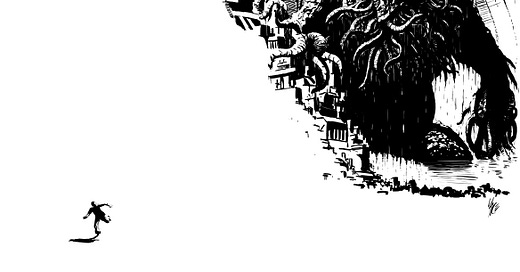I’ve been reading John Langdon’s The Fisherman, which I recommend for cosmic horror types. I’m a sucker for that Lovecraftian stuff — stories about evil beyond time and human comprehension that sets all the normies who encounter it on the fast track to insanity. The colossal size, the ancient age, the suggestion of a deep lore that would blend your brain to ribbons if you ever tried to wrap your mind about it — it’s a fun twist on Spielberg’s trick in Jaws. What’s unseen might be scarier than what’s seen, but how much scarier is something that can’t be grasped even when you do see it?
Part of the fantasy of these stories — and maybe Halloween in general — is this idea of evil as something grand, compelling and worthy of our awe. Lovecraft’s Cthulhu commands the worship of weirdo cults or whatever, and everyone who actually lays eyes on him is either struck speechless forever or never talks about anything else. It’s not that dissimilar from other classic villains whose evil is tinged with regality — Doctor Doom, Darth Vader, Dracula, all the way back to Dante’s Satan. You get the sense that no matter how bad these guys are (and they are mostly guys. And disproportionately D names. Gotta look into that), their worlds would be less without them in it.
But this is a big, fat fiction. We all know it. Evil is ultimately banal, senseless and not particularly awe-inspiring. Just look around. Our most wicked IRL bad guys are mostly just interested in money and other unbearably crude genres of power. Our most awful crimes aren’t ingenious plots but simple acts of shocking hatred. Deplorable sociopaths from King John to Kissinger command no grudging respect, and any delusion that our current mess of actual supervillains in the headlines are playing some sort of six-dimensional chess falls apart the second one of these goons opens their mouth in front of a microphone. Dahmer, the serial killer flavor of the week, is mostly mystifying because the rest of him is so boring in comparison to the heinousness of his actions.
Even in the Bible, contrary to classical depictions of the diabolical, Satan is no darkly majestic king of hell. Our first glimpse of him is as a snake, for crying out loud. Later, in the Book of Job, he’s a petulant tattletale who challenges God to a game of divine dice over one man’s life and then whines about how unfair the rules are each time he loses. Even his temptation of Jesus in the desert is pretty stupid, with the devil utterly failing to egg Jesus on into silly parlor tricks until the Lord finally tires of the guy and tells him to scram. Satan’s big masterstroke — “bow to me and all this can be yours!” — is a blindingly obvious trap and not exactly enticing to the Son of God. But evil can only imagine what it knowns, and all the devil knows is that he would have caved to a deal like that, no problem.
But Dante understandably didn’t find the idea of the devil as a sniveling dweeb all that compelling. More to the point, I think many of us like the idea of evil as something bigger and more imposing than it actually is because it absolves us of our own failures to take action against it. “I’m just a smol bean! I can’t help it if the Machiavellian forces of hell run circles around me!” Acknowledging the banality of evil ultimately means acknowledging how banal we ourselves are when we fall into temptation or sideline ourselves from doing good in the face of injustice.
So when we don’t take a stand against evil, it’s not necessarily because we lack superhuman moral courage or have been outflanked by Lovecraftian forces beyond our control. It is, more often than not, the simple fact that we don’t want to, it’s easier not to, and we have learned to tolerate a little evil in our lives for the sake of our own comfort. Lovecraft himself was a good example — a man capable of building fantastical mythologies of evil but unable to attend to his own well-documented racism, or recognize his complicity in an old and absolutely commonplace wickedness that made his Outer Gods about as terrifying as the Paw Patrol.
A more recent example of this is a story from a couple weeks back, about a group of Michigan parents who positively freaked out over a student’s mural, which they interpreted to be brimming with secret demonic symbols placed there by the student to, I don’t know, curse the school or something? The poor student who painted the mural tried to explain that she didn’t know what they were talking about, she’s not a secret Satanist and for God’s sake it’s just a painting before she fled the meeting in tears.
The parents clapped themselves on the back, convinced that they’d unmasked some sort of occultic plot . "I feel that she did a really good job finding excuses to defend the things she put on,” one woman said, according to NPR. “None of us are that stupid." But, of course, the only evil at play here was the boring idiocy of their craven bigotry, and it seems they all absolutely were that stupid. Evil doesn’t have to be particularly clever to be destructive. That, maybe, is the only very cunning thing about it.
I usually try to add a few links of good stuff I’ve read this week, but I’ve been traveling and haven’t had a chance to read much internet. One thing I did enjoy was Mitchell Atencio’s brief thread about how paywalls do or don’t contribute to the spread of misinformation. It challenged some of my priors. Not sure what I think anymore!





Mostly D names. Please report back on this.